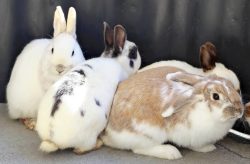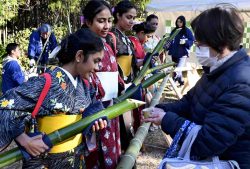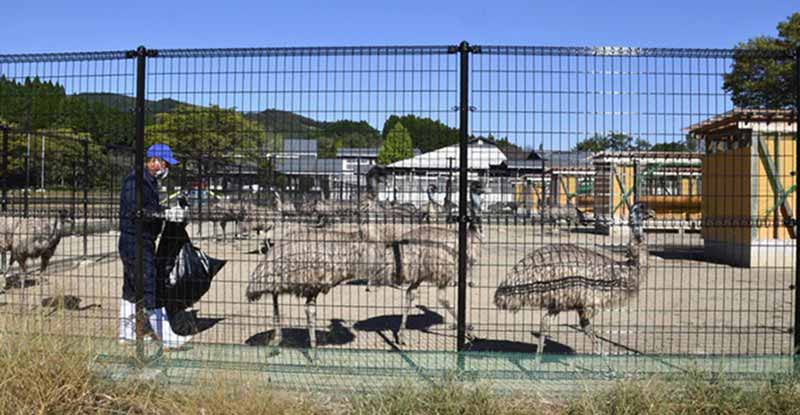
A staff member feeds emus in the breeding facility that was once a school building in Kikuchi, Kumamoto Prefecture, on Oct. 15.
November 28, 2021
KIKUCHI, Kumamoto — A manufacturer of famous Fukuoka souvenir crackers has started raising emus in the mountainous region of Kyushu. Not only is emu meat healthy, their fat is used in cosmetic products. It helps that cracker scraps from the production process can be used as their food.
The project started at the site of a shuttered elementary school in Kikuchi, Kumamoto Prefecture, which was turned into a breeding facility called Kikuchi Emu Tourist Farm.
This year, an incident made the large birds famous nationwide. In October, when the project had just started, as many as 23 emus fled from the facility to the city. The escapees were recaptured over a period of four days with the help of local residents.
The facility apologized and promised to take measures to prevent a recurrence. Locals, meanwhile, still seem to view the tourist farm as a promising star in their aging community.
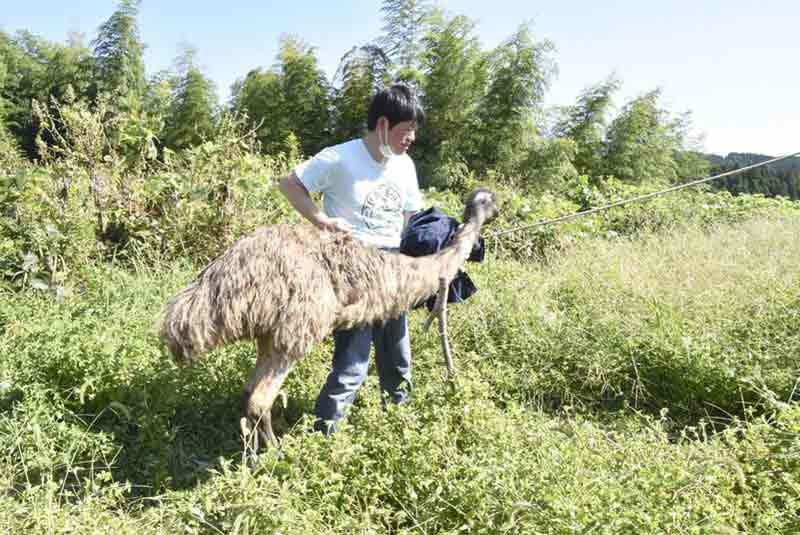
A man captures an escaped emu in Kikuchi, Kumamoto Prefecture, on Oct. 7.
Oil for cosmetics
Yamaguchi Aburaya Fukutaro Co. — a Fukuoka-based snack manufacturer that sells a popular souvenir from Fukuoka called menbei, a potato cracker containing mentaiko spiced cod roe — is involved in the emu-breeding project.
The company manufactures another kind of potato cracker, called Hogaja, at its factory in Hokkaido, and the leftover scraps from the manufacturing process are used as food for the emus at a different farm. The factory provides these scraps to Okhotsk Emu Pasture in Abashiri, where the company learned about the various possibilities of emus. This inspired the company to also raise emus in Kyushu, using the abandoned school in Kikuchi.
The emu is a flightless bird native to Australia and similar to the ostrich. They reach adulthood in about two years and can exceed two meters tall. They are easy to raise because they are resistant to temperature differences and are not aggressive.
Emu’s meat is soft, high in protein, low in calories and healthy, according to Kenta Wada, a professor at Tokyo University of Agriculture. The university has a Hokkaido-Okhotsk Campus in Abashiri, Hokkaido, and the professor studies emus living in the city. He said that about 6 liters of oil can be extracted from the fat of an individual bird, which has moisturizing and anti-inflammatory properties. The oil is used in cosmetics and ointments.
Encouraging tourism
Yamaguchi Aburaya Fukutaro established a joint venture with Nippon Shokuhin, a meat processing company in Koga, Fukuoka Prefecture. They signed an agreement with the Kikuchi city government to establish a tourist farm in the former Hakusui Elementary School, which was closed in 2013.
The farm purchased 55 emus, each about 9 months old, from the farm in Abashiri. After shipping them by truck to Kikuchi, in December they started raising the emus, feeding them on scrap pieces of menbei.
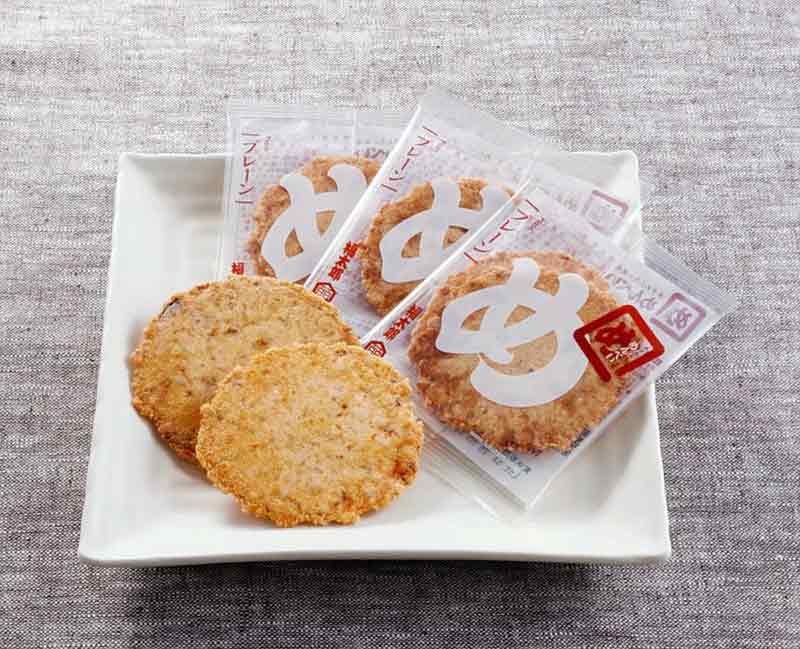
Menbei
For the time being, the company will continue breeding over the next few years with the hopes of eventually having several thousand birds, all while researching breeding methods in cooperation with Tokyo University of Agriculture. If all goes well, the farm will sell meat from the birds and develop cosmetics.
The facility is a tourist farm that has yet to open to the public after preparations were delayed due to the pandemic. The operators hope it will open as a tourist facility as early as next spring, with plans to renovate the old school building into a restaurant that offers emu meat on the menu.
Many locals want to see the emus as soon as possible. There are also high hopes the facility will become a catalyst for revitalization in the area as a tourism resource and a place of employment.
Great escape of 23 birds
The game of tag between emus and humans began early in the morning of Oct. 7, when residents of Kikuchi, Kumamoto Prefecture, saw a large bird strutting along a street.
The staff of Kikuchi Emu Tourist Farm and city officials checked the facility and found that 23 of 54 birds kept there had escaped. The entrance to the farm is made of a metal fence that was locked, but it is believed to have been opened by excited emus physically attacking it while in heat.
In addition to about 100 people from the farm and the municipality, local residents also rushed to search for the emus as they had learned about the incident through news reports. The emus are usually friendly and gentle, but they are so large that there is no denying their danger. It took two people to capture one bird using nets and ropes.
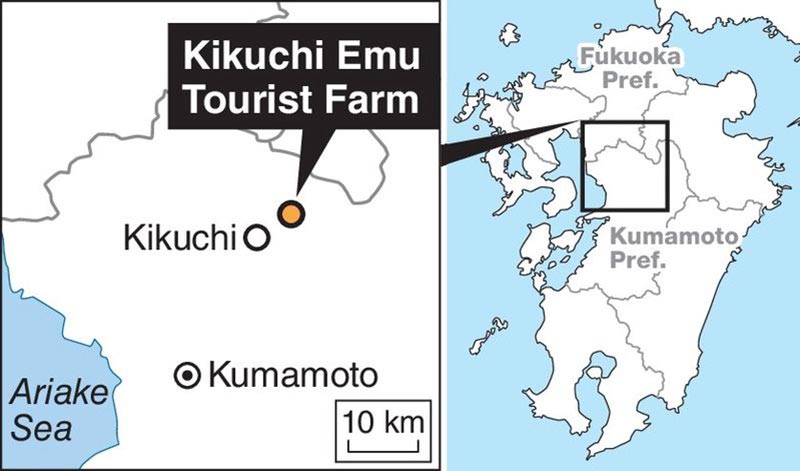
Two of the escaped birds died, but the remaining 21 were brought back to the farm over the next four days. The farm officials said they will work to prevent a recurrence, such as installing sensors and additional locks.
However, following the reports of the escape, people’s interest in the birds grew. There have been inquiries such as “Do you sell eggs?”
“We must apologize for the inconvenience, but we are grateful for the warmth of the local residents,” said an official at the farm. “They helped us capture the birds.
“We want to create a tourist farm where they can also be happy.”
A 63-year-old local community leader said: “I was surprised to hear about their escape, but as there are few young people in this area, I want to look at that farm from a long-term perspective.”
Related Tags
Top Articles in Features
-

Sapporo Snow Festival Opens with 210 Snow and Ice Sculptures at 3 Venues in Hokkaido, Features Huge Dogu
-

Tokyo’s New Record-Breaking Fountain Named ‘Tokyo Aqua Symphony’
-

Tourists Flock to Ice Dome Lodge at Resort in Hokkaido, Japan; Facility Invites Visitors to Sleep on Beds Made of Ice
-

High-Hydration Bread on the Rise, Seeing Increase in Specialty Shops, Recipe Searches
-

Heirs to Kyoto Talent: Craftsman Works to Keep Tradition of ‘Kinran’ Brocade Alive Through Initiatives, New Creations
JN ACCESS RANKING
-

Japan PM Takaichi’s Cabinet Resigns en Masse
-

Japan Institute to Use Domestic Commercial Optical Lattice Clock to Set Japan Standard Time
-

Israeli Ambassador to Japan Speaks about Japan’s Role in the Reconstruction of Gaza
-

Man Infected with Measles Reportedly Dined at Restaurant in Tokyo Station
-

Man Infected with Measles May Have Come in Contact with Many People in Tokyo, Went to Store, Restaurant Around When Symptoms Emerged




